
How to Use HC-SR04 Ultrasonic Sensor: Examples, Pinouts, and Specs
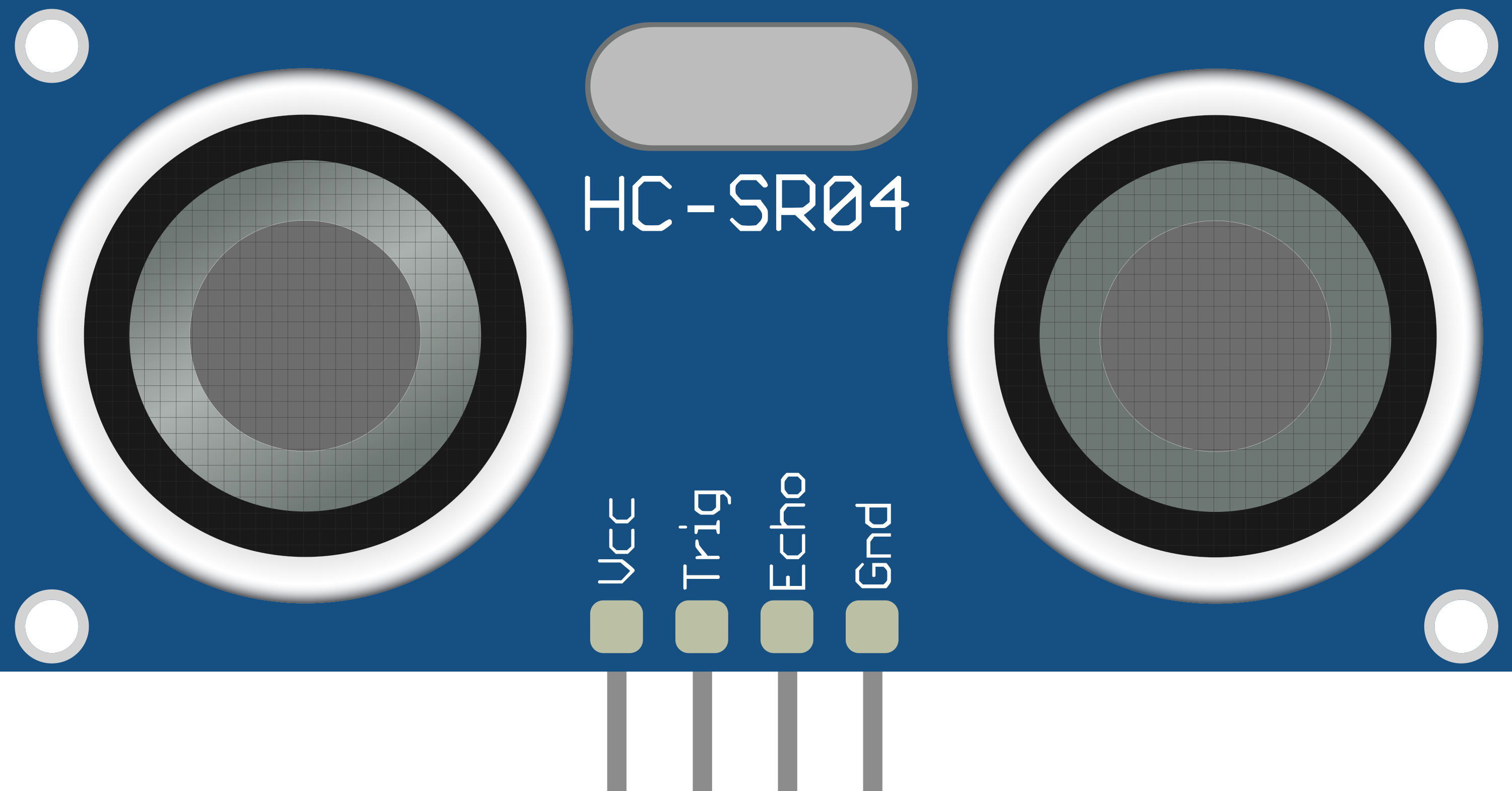
 Design with HC-SR04 Ultrasonic Sensor in Cirkit Designer
Design with HC-SR04 Ultrasonic Sensor in Cirkit DesignerIntroduction
The HC-SR04 is an ultrasonic distance sensor that uses sonar to measure the distance to an object. It emits a high-frequency sound wave and measures the time it takes for the echo to return, allowing it to calculate the distance based on the speed of sound. This sensor is widely used in robotics, automation, and obstacle detection systems due to its accuracy, affordability, and ease of use.
Explore Projects Built with HC-SR04 Ultrasonic Sensor
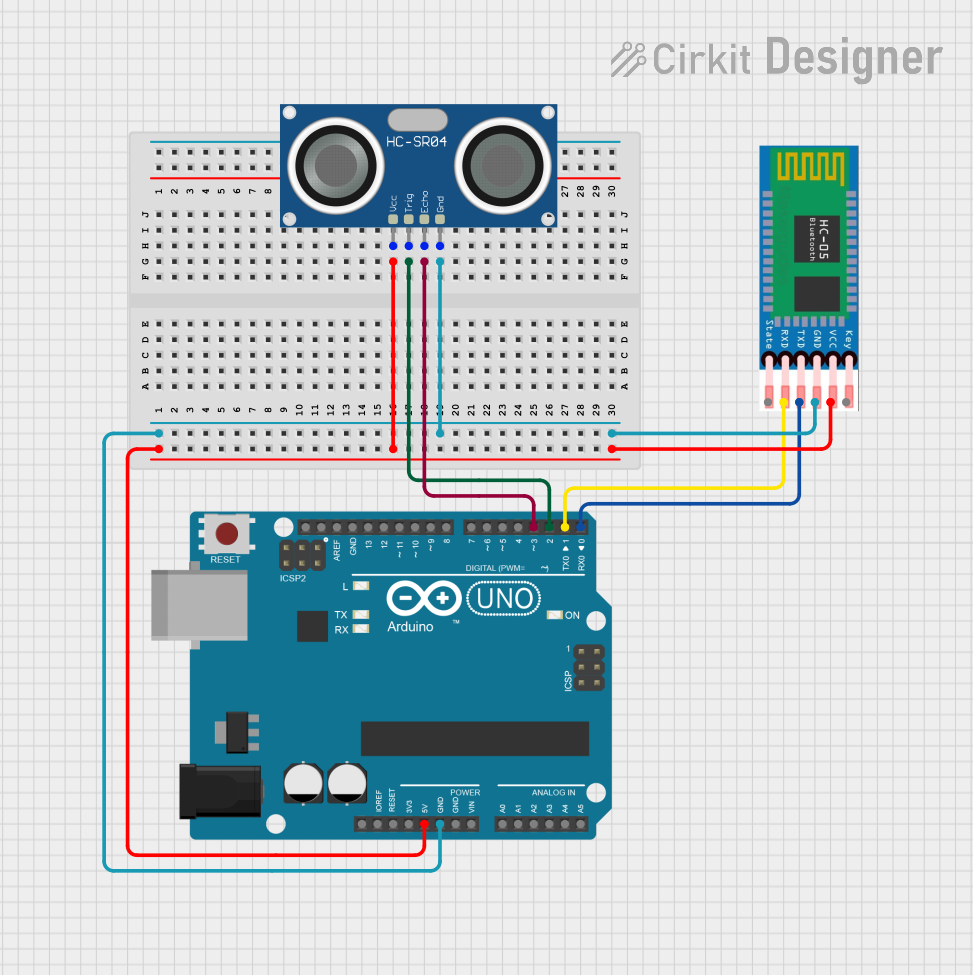
 Open Project in Cirkit Designer
Open Project in Cirkit Designer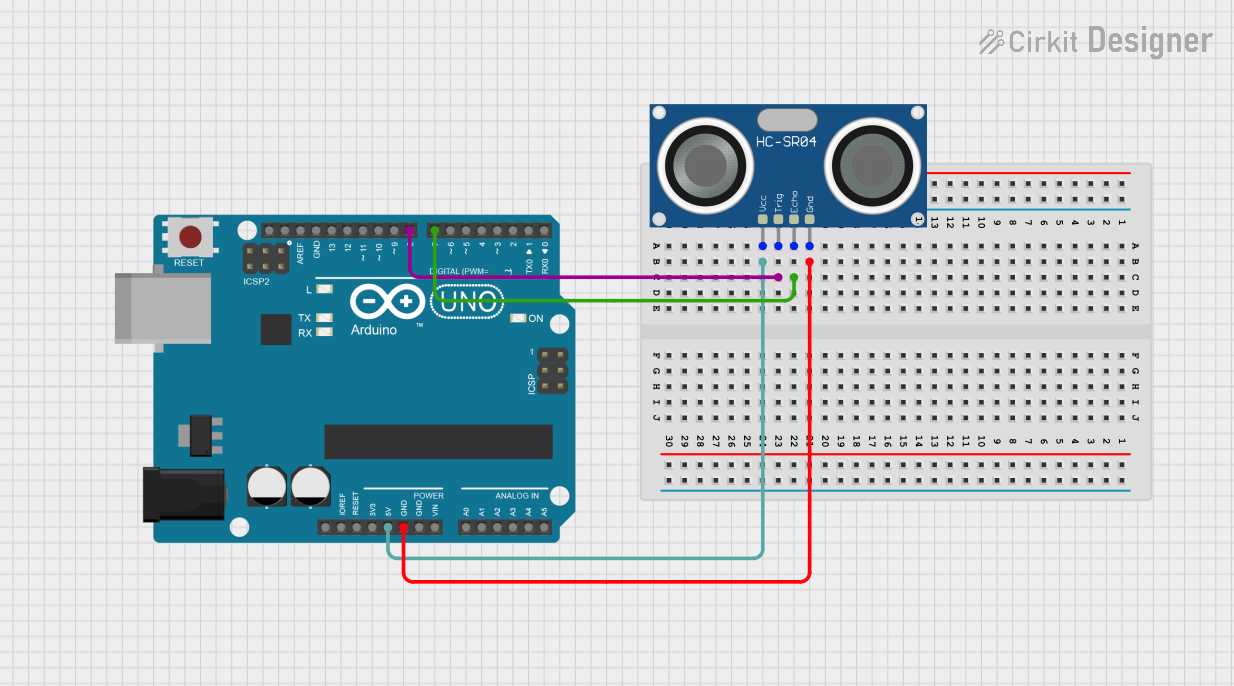
 Open Project in Cirkit Designer
Open Project in Cirkit Designer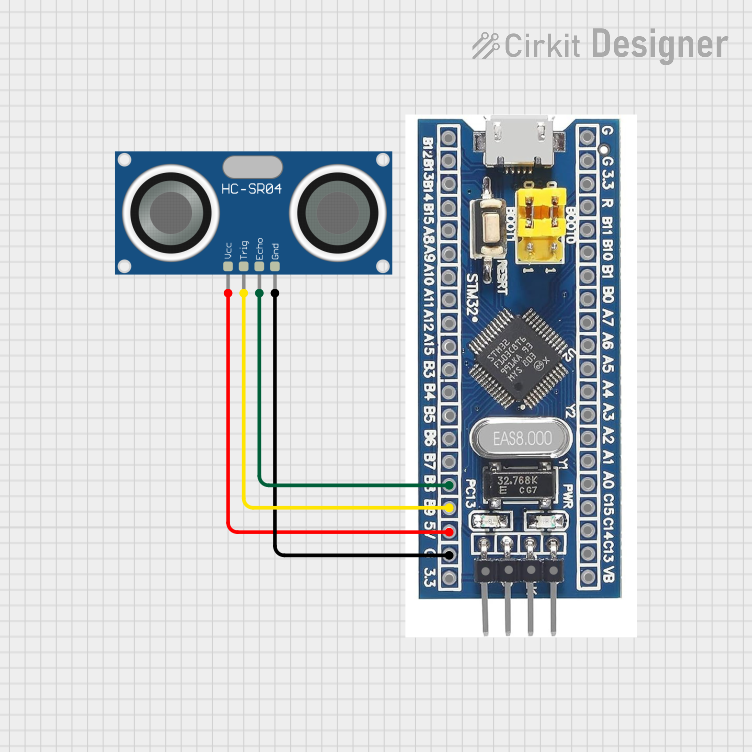
 Open Project in Cirkit Designer
Open Project in Cirkit Designer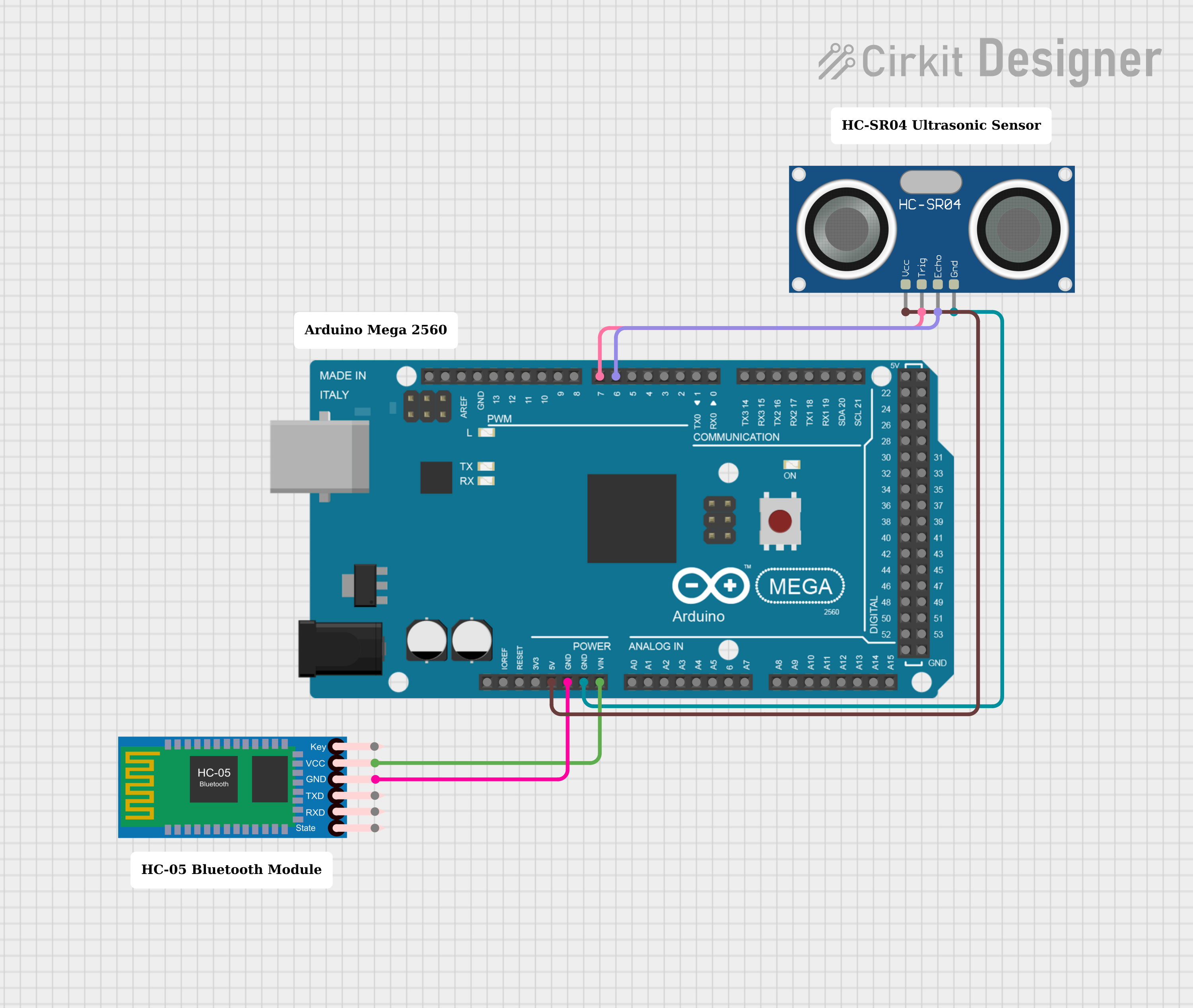
 Open Project in Cirkit Designer
Open Project in Cirkit DesignerExplore Projects Built with HC-SR04 Ultrasonic Sensor

 Open Project in Cirkit Designer
Open Project in Cirkit Designer
 Open Project in Cirkit Designer
Open Project in Cirkit Designer
 Open Project in Cirkit Designer
Open Project in Cirkit Designer
 Open Project in Cirkit Designer
Open Project in Cirkit DesignerCommon Applications and Use Cases
- Obstacle detection in robotics
- Distance measurement in automation systems
- Liquid level sensing
- Proximity detection in security systems
- Parking assistance systems
Technical Specifications
The HC-SR04 sensor is designed for precise distance measurement and operates within a specific range of environmental conditions. Below are its key technical details:
| Parameter | Value |
|---|---|
| Operating Voltage | 5V DC |
| Operating Current | 15 mA |
| Measuring Range | 2 cm to 400 cm (0.02 m to 4 m) |
| Accuracy | ±3 mm |
| Measuring Angle | 15° |
| Operating Frequency | 40 kHz |
| Trigger Input Signal | 10 µs TTL pulse |
| Echo Output Signal | Pulse width proportional to distance |
| Dimensions | 45 mm x 20 mm x 15 mm |
Pin Configuration and Descriptions
The HC-SR04 has four pins, as described in the table below:
| Pin | Name | Description |
|---|---|---|
| 1 | VCC | Power supply pin. Connect to 5V DC. |
| 2 | Trig | Trigger pin. Send a 10 µs HIGH pulse to initiate distance measurement. |
| 3 | Echo | Echo pin. Outputs a pulse whose width corresponds to the measured distance. |
| 4 | GND | Ground pin. Connect to the ground of the power supply. |
Usage Instructions
The HC-SR04 sensor is simple to use and can be integrated into a variety of circuits. Below are the steps to use it effectively:
Connecting the HC-SR04
- Connect the VCC pin to a 5V power supply.
- Connect the GND pin to the ground of the power supply.
- Connect the Trig pin to a digital output pin of your microcontroller (e.g., Arduino).
- Connect the Echo pin to a digital input pin of your microcontroller.
Measuring Distance
- Send a 10 µs HIGH pulse to the Trig pin to trigger the sensor.
- The sensor will emit an ultrasonic wave and set the Echo pin HIGH.
- Measure the duration of the HIGH signal on the Echo pin. This duration corresponds to the time taken for the sound wave to travel to the object and back.
- Use the formula below to calculate the distance: [ \text{Distance (cm)} = \frac{\text{Time (µs)} \times 0.034}{2} ] The factor 0.034 represents the speed of sound in cm/µs, and the division by 2 accounts for the round trip of the sound wave.
Example Code for Arduino UNO
Below is an example Arduino sketch to measure distance using the HC-SR04:
// Define pins for the HC-SR04 sensor
const int trigPin = 9; // Trigger pin connected to digital pin 9
const int echoPin = 10; // Echo pin connected to digital pin 10
void setup() {
// Initialize serial communication for debugging
Serial.begin(9600);
// Set pin modes
pinMode(trigPin, OUTPUT); // Trig pin as output
pinMode(echoPin, INPUT); // Echo pin as input
}
void loop() {
// Send a 10 µs HIGH pulse to the Trig pin
digitalWrite(trigPin, LOW);
delayMicroseconds(2);
digitalWrite(trigPin, HIGH);
delayMicroseconds(10);
digitalWrite(trigPin, LOW);
// Measure the duration of the HIGH signal on the Echo pin
long duration = pulseIn(echoPin, HIGH);
// Calculate the distance in cm
float distance = (duration * 0.034) / 2;
// Print the distance to the Serial Monitor
Serial.print("Distance: ");
Serial.print(distance);
Serial.println(" cm");
// Wait before the next measurement
delay(500);
}
Important Considerations and Best Practices
- Ensure the sensor is powered with a stable 5V DC supply for accurate readings.
- Avoid placing the sensor in environments with excessive noise or vibrations, as these can interfere with measurements.
- The sensor's measuring angle is 15°, so ensure there are no obstructions within this cone for accurate results.
- Use a capacitor (e.g., 10 µF) across the VCC and GND pins to filter out power supply noise.
Troubleshooting and FAQs
Common Issues and Solutions
No Output or Incorrect Readings
- Ensure the sensor is connected to a 5V power supply.
- Verify the wiring and ensure the Trig and Echo pins are connected to the correct microcontroller pins.
- Check for loose connections or damaged wires.
Fluctuating Distance Measurements
- Ensure there are no moving objects or noise sources near the sensor.
- Add a capacitor across the power supply pins to stabilize the voltage.
Sensor Not Responding
- Confirm that the Trig pin is receiving a 10 µs HIGH pulse.
- Test the sensor with a different microcontroller or power supply to rule out hardware issues.
FAQs
Q: Can the HC-SR04 measure distances less than 2 cm?
A: No, the minimum measurable distance is 2 cm. Objects closer than this may not be detected accurately.
Q: Can the HC-SR04 be powered with 3.3V?
A: The HC-SR04 is designed for 5V operation. While it may work at 3.3V, the performance and accuracy may be compromised.
Q: How can I increase the accuracy of the sensor?
A: Use the sensor in a stable environment, avoid obstructions within the measuring angle, and ensure a clean power supply.
Q: Can the HC-SR04 detect transparent objects?
A: The HC-SR04 may struggle to detect transparent objects like glass, as ultrasonic waves can pass through them or reflect poorly.